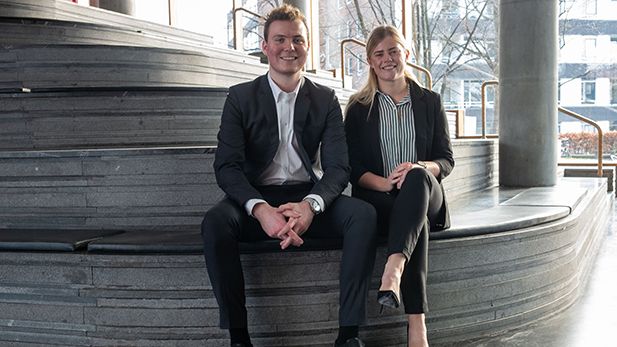Training for case competition – and for the future

Photo: Jørn Albertus, CBS students Tobias Brix og Rikke Damgaard.
Rikke Damgaard (2nd year International Business and Politics) and Tobias Brix (2nd year BSc EBA) are two out of four participants representing CBS during the 17th consecutive CBS Case Competition. Here 12 teams from all over the world will compete to solve a case for a company. A year ago, neither Rikke nor Tobias had imagined that they would ever represent CBS in an international Case Competition. When Rikke participated in the training programme Case Academy last spring, it was just for the experience of trying it out. Today, none of them can imagine not doing it.
In the interim period, they have trained up to 40 hours a week and participated in international competitions in Bangkok and Singapore. Right now, they are going through the final training, which is carried out by CBS’ coach Caroline Krzton and a number of external consultants.
"It is challenging to participate, especially because there is so much you have to keep track of at once," Tobias explains. “First of all, you need to solve the task in the best possible way. But that is not enough to present a great solution. You must also present it in a convincing manner and be able to argue your points.”
In order to do the perfect presentation, the participants go through intensive presentation training, including detailed critique of everything from gesticulation and tone of voice to the content of the PowerPoint.
“Speaking in front of an audience does not feel natural to me and having every move watched and critiqued does not make me feel more comfortable in the speaking role,” Tobias admits. “But we all want the presentation to be flawless, and every time you are asked to start over, you have learned something and it feels good to see how you constantly improve.”
Although the training for week 9 is the same as for their previous competitions, they both feel an additional pressure in performing “at home”. Both because a lot of effort is put into setting up the case competition for the 12 participating teams from all over the world as well as the audience, and because they are to perform in front of friends, fellow students and family. In addition, most of the judges are well-known profiles from large Danish companies and therefore attractive potential future employers.
Collaborating with companies also play a huge role in between competitions. The teams collaborate with a number of established companies as well as start-ups. This means that the participants can practice cases that have a real significance for the companies, which brings seriousness into the work. In addition, many of the training partners themselves have participated in case competitions and can therefore pass on useful advice to the participants.
Rikke and Tobias agree that the hard training does not only help them in case competitions but also prepares them for a future in the labour market; the techniques they learn are ideal for pitching ideas to colleagues and managers as well as for cracking real-life business challenges. Alongside this, taking part in the competitions help them build a strong network among fellow students as well as prominent companies around the world.
"In the months up to a case competition, all my effort is put into that one thing," Rikke says. "At the same time, everyday life goes on around me, and my studies are not put on hold. It is a matter of hard-core prioritising and planning, so I try to get ahead with my studies before the competition, and then I catch up on the rest afterwards. It may seem like I have to balance a lot at once, but I am rewarded both academically and socially by participating, so there is no doubt that it is worth it."
Rikke is from Herning and studies IBP
Tobias is from Lyngby and studies BSc EBA
Read more about CBS in case competitions
Find out how you can apply to become part of CBS’ International Case Competition team (deadline March 8). Only access for CBS students.
What is a Case Competition?
A case competition is a competition where students from anywhere between 8 and 30 universities compete to solve a business case in the best possible way. Each university sends a team of students and their coach to the competition. The teams receive the business case and are then sequestered from the other students for anywhere between of 24 to 60 hours on-site - and even longer if the research is done ahead of time off-site.
During that time, team members must:
Read the business case anywhere from 2 to 300 pages
Identify the issues
Develop a solidly worked out plan to resolve the issues
Prepare a presentation to convincingly communicate the proposals/plan for the "board of directors" or relevant body (jury of judges)
CBS holds Case Competition in week 9 for the 17th time.